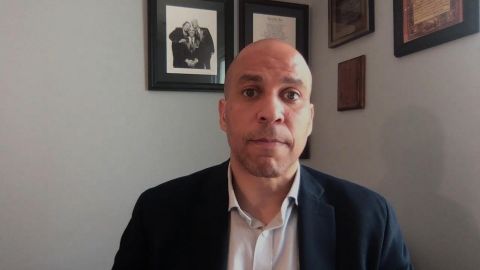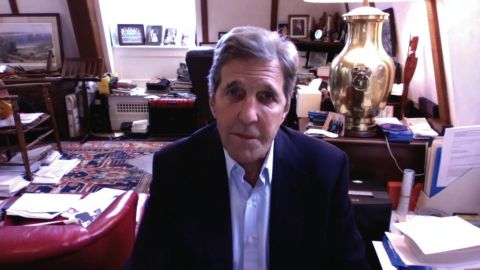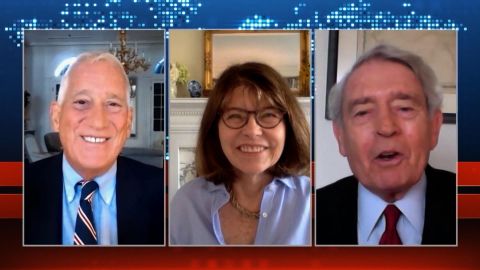Read Transcript EXPAND
CHRISTIANE AMANPOUR: And now, we know that this year’s conventions will be memorable for being so different. But throughout history, these nominating parties have generated moments that still burn bright to this day. Our next guests are perfectly positioned to curate this perspective. Dan Rather was a long-time anchor of the CBS Evening News, and Margaret Carlson, a columnist for the Daily News now was the first female columnist for “Time” magazine. Here they are speaking with our Walter Isaacson about some of their standout moments of the past.
(BEGIN VIDEO TAPE)
WALTER ISAACSON: Thank you, Christiane. And Margaret Carlson and Dan Rather, welcome to the show, both of you.
DAN RATHER, FORMER ANCHOR, CBS EVENING NEWS: Thank you. Good to be with you, Walter.
ISAACSON: We go a long way back on conventions and I remember all of us always saying, these things are so pointless, they don’t really have any meaning in this day and age. But now, what do you think we might be losing if we don’t have these type of in-person conventions?
RATHER: Well, we lose a lot of focus. These two weeks have given us focus, kind of a national teach-in, if you will, or a master class in politics on what our democracy hopes to be and thinks it can be and thinks it is. The other thing we miss is the sheer joy of it. The conventions are what I call a dance of democracy. And now, with this unprecedented virtual convention today, sort of the music has gone out of the dance but we’re still doing the steps, if you follow that metaphor. The parties could decide going forward that they all (INAUDIBLE) to a city convention is a thing of the past. It’s one of the unknowns actually going forward. But certainly, I personally as a journalist, miss the conventions. You know, even the hullabaloo and the boos and from the (INAUDIBLE) and the balloons and the crowds. And yes, I miss the bar that that open at 11:00 in the morning, a chance to really smooth your politicians. But there was a sense of the old fashion conventions before we move to this virtual one. Things did get decided there, certainly in the earlier part of the mid-century, of the 20th century. When John Kennedy chose Lyndon Johnson to be his running mate at the 1960 convention in Los Angeles, what a stunner. I mean, only if the pope had turned Baptist would you have been any more surprised than you would have been surprised at that, and with the tumultuous atmosphere of both the conventions in 1968, the Democratic Morgan. The Republicans — there with the whole world watching, America’s divisions were right there on the television screen. I mean, things were actually decided at conventions. By the time we got to almost 1980, the 1980 when Ted Kennedy made a run an incumbent President Carter, and a pretty good run, I would argue that may be the last convention at which at the convention something really important was actually decided. But even the ones that came after 1980, there is a certain excitement that I think reflects the country wanting to focus on who we want to be, where we want to go and who we want to take us there.
AMANPOUR: You know, Margaret, every now and then, the surprises in 1988 convention down here in New Orleans. And I think you and I were together. We were in charge to figure out who the vice president was going to be. And suddenly one day before he was supposed to announce it, Bush announces Dan Quayle, and you had to scramble.
MARGARET CARLSON, COLUMNIST, THE DAILY BEAST: Oh, did we ever, because the only thing we heard from the Bush people was how much Senator Ted Kennedy respected Dan Quayle for their work on the Labor Committee. We didn’t know much — you know, he’s a decent guy, a quiet guy from Indiana, and, you know, there was a little suspense. In Dan’s day there was a lot more than in mine, but the vice-presidential pick was sometimes held until the very end instead of — well, when is he going to say it? And if the presidential candidate doesn’t reveal it, what’s wrong with that campaign that they can’t get themselves together to announce this? But now, mostly that element is gone. Another element that’s going to be gone this time is last week when I was watching the Biden-Harris rollout, at the end of it, they waved the way — you know, the professional wave and then you see somebody you went to camp with in the audience and you start pointing. Gone. They were waving to an empty room, just about, except for a few friends and family and the press that got in. So, you ask, what’s the sound of no hands clapping? And the clapping and the audience, it really creates something all on its own. And, Walter, I remember you not as a dancer or a music guy, but when the balloons dropped, you kind of went with the music because it’s a great moment when the family comes one by one until the whole stage is full and then you see Bush’s fourth cousin twice removed is out there on the fringes. And one I remember that went on forever is the don’t stop thinking about tomorrow, and we’re not going to have that.
ISAACSON: You know, one of the most memorable modern moments in the convention was 1968, and you were a new CBS News correspondent on the floor, Dan. You were covering the White House, I think, and you were one of those floor correspondents and you got dragged out with Walter Cronkite narrating. Tell me how that happened.
RATHER: Well, there was a great effort to keep a lid on it in Chicago. Inside the hall, Mary Daly (ph), the Chicago (INAUDIBLE), was in cahoots, if I can use the Texas word, with the main part of the Democratic Party. To keep the lid on the inside of the hall while the nomination is actually happening. Outside it was held by, you know, the police and the protesters. What a tumultuous time. So, in the middle of that, from the (INAUDIBLE) when they said everybody stay in their seats, nobody move from their seats, well, during that, a Georgia delegate got up and people in plainclothes, they — one of the officers grabbed him and started wrestling him out to the hall. Well, it was a floor reporter. I said, this is a story, what the hell was going on here? And the guys who were wrestling him out in the hall eventually one of them hit me in the solar plexus, knocked me down because they didn’t want me to interview this Georgia delegate. As it turned out later, the Georgia delegate was desperate to go to the men’s room. He wasn’t meeting in revolution, he just wanted to go to the men’s room, but because the orders from above that nobody move. So, it was a microcosm of exposing the extreme effort to keep control of the convention inside as well as control the protesters in the outside.
ISAACSON: It was on live and Cronkite cut the camera to you just as you were being hit, right?
RATHER: That’s correct. And so, you know, it was on live television and it went — we would say these days, viral all over. We didn’t have the internet at that time. But I think the point was it drew attention, as they say, in a really unprecedented effort to keep the control inside the convention hall and outside the convention hall, and it didn’t work.
ISAACSON: This is the 100th anniversary of the 19th Amendment giving women the right to vote. And I certainly remember a lot of memorable moments at conventions that elevated women in politics, whether it was Ann Richards’ speech at the — opposing George H.W. Bush or I think Palin, Margaret, you’ve written about her. Tell about — Margaret, let’s start with you, some of the most memorable moments that involved women in politics.
CARLSON: Well, you know, there’s the Geraldine Ferraro moment which was a first and was very, very exciting. She ultimately lost, just like Hillary Clinton ultimately lost, but these are not lost on women. And isn’t it fitting that the 100-year anniversary comes as we have the first black woman on the Biden-Harris ticket? You remember, Walter, I think we had — we were always celebrating the year of the woman in the magazine and then it turned out not to be the year of the woman. But after the Clarence Thomas hearings, so that must have been ’92, we did have a small year or the woman when six women were elected to the Senate. Before that it had been Mikulski and (INAUDIBLE) in there. It – – California elected two women, Boxer and Feinstein. And then this year, we have Harris. In 2018, the House turned Democratic, in part because of all the women who were elected. So, you get the vote, and then it takes a long time for your vote to be appreciated and for your participation. In the rollout of Kamala Harris, Senator Harris, there were interviews with all these black women who had done amazing things in their communities, in their states that we hadn’t heard of. It felt like everything they done had come to fruition.
ISAACSON: And, Dan, you remember when Palin got the vice presidential bid from McCain.
RATHER: Oh, I remember it as if it was yesterday. Again, it was a stone-cold stunner that nobody expected with John McCain. But, as we now know, we realize he was behind, and he needed a desperate gamble. In this case, the gamble did not pay off. But it was a long shot gamble to reverse what had become the narrative of the campaign. But even much earlier, as early as 1964, I can remember this was when Lyndon Johnson was essentially (INAUDIBLE) it was, but there was a renegade delegation from Mississippi represented by a black woman whose name I think was Hamer.
ISAACSON: Fannie Lou Hamer?
RATHER: Provided one of the more important and brighter moments of that otherwise dull 1964 Democratic Convention, when they insisted to be heard, and were making the point that, number one, people of color were underrepresented at the convention, and, number two, so were women.
ISAACSON: What did you think, Margaret, when you first saw Sarah Palin, because she was electrifying at the convention?
CARLSON: Oh, Walter, that speech was so electric. And she was spectacular. She just had this spirit and this presence. And I was so swept away. And I got to write the piece, thank you. And the headline on it was — and I want to take this back before I say it — “A Star Is Born.” That’s how good that speech was. And when she — we won’t have that this time, a co-campaign — but when she was out on the campaign trail with McCain, she made him 20 years younger. They didn’t campaign that much together. But when they did, it was really good for him. The problem was, she didn’t know very much and she hadn’t really seen that much from her front porch in Alaska, certainly not Russia. And she became a caricature after the Katie Couric interview, which shows how you can go up in politics and how you can come down and say, in Hillary Clinton’s case, how you can rise again.
ISAACSON: Margaret, from what I remember, what happens at the convention itself in the hall is sometimes less important than what’s happening at all the breakfasts, the briefings, the discussions, and, for that matter, the socializing and the parties. Why was that so important to the way democracy worked and to the way we covered politics?
CARLSON: Well, most of the people that you meet, you don’t meet actually on the floor of the convention. I won’t name a great journalist who told me, why do you care so much about getting a floor pass? I never go to the floor. And he just hung out in all the places you needed to be. Started with breakfast at 7:00 and closed the bar at 2:00 a.m. and then went to an after-party, because, in the village of the convention, in that area surrounding it and all the bars and parties, not only everybody knows everybody, but everybody acts like they know everybody. So you can walk up and talk to somebody you have never met, like Donald Trump, or actually Bill Clinton. And that would matter later on. And then, also, they get to know you, whether they’re going to talk to you when you pick up the phone. So, it all matters, because it’s a futures game when you’re at the convention, as well as what’s happening right then and there.
ISAACSON: Give me an example, Dan, or a memory or two of what may have happened to you at the fringes of the convention where you learned something.
RATHER: Well, 1960 was the first year in which I covered both conventions, both the Democrat and Republican Conventions. I was not yet at CBS News. I was covering for a regional television network. And a high-ranking member of the Johnson staff, in fact, John Connally, who was governor and right hand of the president, did take me aside. I didn’t know particularly, but I did knew him. Did take me aside and he said, don’t assume that LBJ won’t be on the ticket. And when he said that to me, frankly, I was saying to myself, yes, but I don’t think it’s very likely. And, of course, it turned out to be true. So that was a very valuable piece of information. I wish I had taken it and run with it a little harder, but I was very suspicious of it.
ISAACSON: Margaret, do you worry that candidates can now just bypass the news media and that what happens on TV and in newspapers doesn’t really matter much?
CARLSON: Do I ever worry about that, and does it ever hurt me, because think about the convention we’re about to see. It could be the Twitter convention, in which the first impression people get is from their Twitter feeds, skipping us altogether, because we will be coming out in the middle of the night. You know, it’s — we were there in the golden age of journalism. So much has happened and so much is lost. And I don’t think it’s just because I’m in it that I say that. I think, someday, people will come back to the notion that we weren’t fake news, and that buying a newspaper, as a citizen, was a good thing to do, and that it mattered. How you used to learn about what was happening in your government really mattered.
ISAACSON: Some of the most memorable moments for me at conventions have been the great speeches, whether it was Ted Kennedy’s a dream shall never die at that 1980 convention we have been talking about, or Jesse Jackson taking the early morning bus. Margaret, what’s most memorable for you in terms of great convention speeches?
CARLSON: Well, the first always being the best. In 1988, George Bush gave a speech that was so unlike George Bush, because he had to talk about himself and the great I, which his mother told him never to say. And he had one line in there. And he said, “I am a quiet man, and the quiet people hear me.” And I thought that is not just him, but it was his presidency, in which he almost always did what he thought was right, whether or not we thought it. And I was just impressed by that.
ISAACSON: Dan?
RATHER: The one that stands out the most was Barack Obama, who had just been elected the senator from Illinois, made a tremendous speech at the 2004 convention. And I interviewed him immediately after that speech. And most politicians, they drill you in the eyes, make strong eye contact. But hearing the speech and the way he handled himself in the wake of that speech, I did find myself saying, there’s a great future ahead for him. I can’t say I thought he would become president of the United States as quickly as he did. But for a speech that was not a candidate on the ticket, it was the most memorable talk, a tremendous speech. And every young aspiring politician, whatever their party, they would do worse than to take that Obama’s speech, which vaulted him into the national consciousness, as a model for how to make a brilliant convention speech on television.
ISAACSON: Dan Rather, Margaret Carlson, I hope I’ll see you all at a convention someday in the future, but thanks for being with us this evening.
RATHER: Thank you, Walter.
CARLSON: Thanks.
About This Episode EXPAND
Christiane speaks with John Kerry and Cory Booker about the Democratic National Convention. Walter Isaacson speaks with journalists Dan Rather and Margaret Carlson about past conventions.
LEARN MORE


